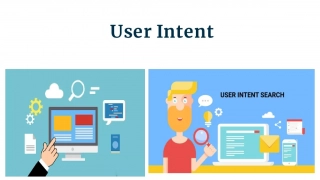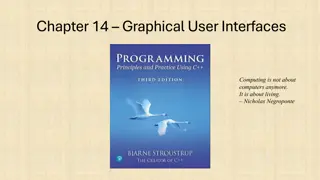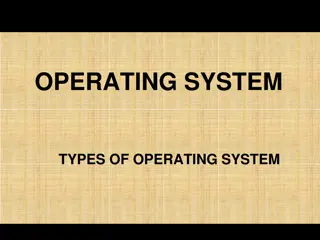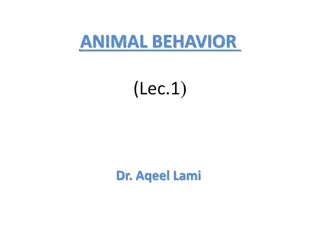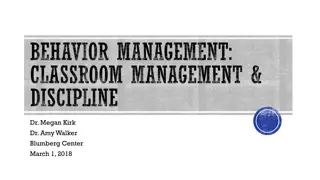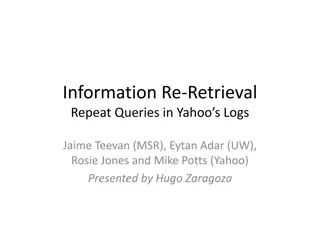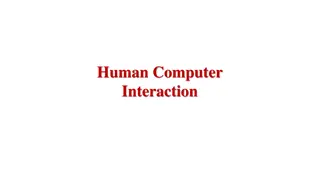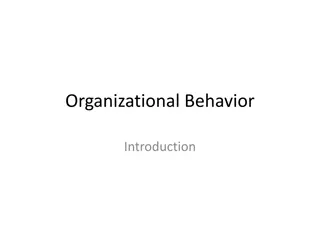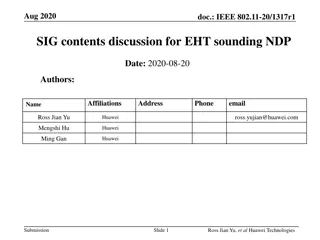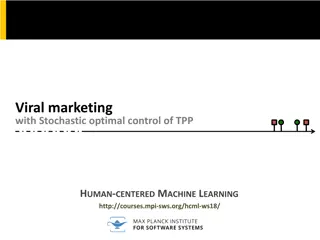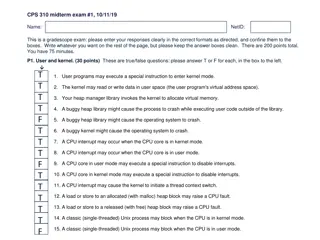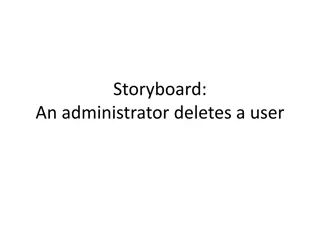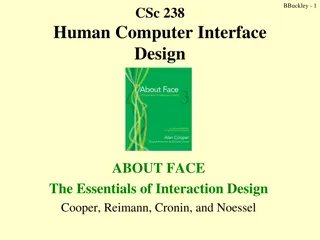Function Based Thinking
Function-based thinking in Missouri Schoolwide Positive Behavior Support, emphasizing data-based decision-making, mission clarity, and effective teaching practices. Understand how behavior is related to the environment and how environmental interventions play a key role in shaping expected behaviors
6 views • 27 slides
Maximizing Impact: The Role of Rich Snippets in SERPs"User Intent
User intent, also known as search intent, refers to the underlying goal or purpose a user has when performing an online search. It goes beyond the literal interpretation of keywords and focuses on understanding why a person is searching. Recognizing and catering to user intent is crucial for creatin
3 views • 10 slides
Addressing Predatory Behavior in the Fellowship
Predatory behavior, especially towards vulnerable members, is a concerning issue in the fellowship. This behavior includes unwelcome advances, exploitation of power dynamics, and institutional sexism. The discussion on predatory behavior necessitates honest dialogue and a united approach for a safer
3 views • 13 slides
Operating Systems
An operating system is a crucial program that manages all other programs on a computer. It handles tasks like input recognition, file management, and device control. There are different types of operating systems such as single-user, single-task systems, multi-user, multi-task systems, real-time ope
6 views • 11 slides
The Evolution of Graphical User Interfaces in Computing
Graphical User Interfaces (GUIs) have transformed computing into a more user-friendly and interactive experience, emphasizing the shift from technology-focused to human-centric living. This chapter delves into the various aspects of GUIs, including I/O alternatives, common GUI tasks, programming per
1 views • 32 slides
Understanding Linux User Capabilities and Namespace Management
Linux user namespaces and capabilities play a critical role in managing system security and permissions. Users and groups are assigned unique IDs, and processes are associated with the user's ID. The kernel enforces permission checks based on user IDs and group IDs, allowing root access to bypass ce
0 views • 14 slides
Understanding Heuristic Evaluation in User Interface Design
Heuristic evaluation is an analytical method where experts evaluate interfaces based on usability principles. This evaluation helps in identifying potential design issues that may impact user satisfaction. The process involves a small group of evaluators reviewing the interface against a set of reco
5 views • 12 slides
Understanding Consumer Behavior in Marketing
The design of a marketing program starts with understanding consumer behavior. Consumers, as the end users, play a crucial role in shaping market trends. Producers seek insights into consumer personas, market behaviors, and influencing factors. Management focuses on the consequences of consumer beha
2 views • 26 slides
Understanding Psychology: The Science of Behavior and Mental Processes
Psychology is the scientific study of behavior and mental processes. Psychologists study both observable behavior and private mental processes. The primary goals of psychology are to describe, understand, predict, and control behavior. Different branches of psychology, such as applied psychology, cl
2 views • 29 slides
Understanding Different Types of Operating Systems
An operating system is the crucial program that manages a computer's resources and acts as an interface between the user and the machine. Various types of operating systems exist, including real-time, multi-user vs. single-user, multi-tasking vs. single-tasking, distributed, and embedded systems. Re
1 views • 11 slides
Understanding Inmate Behavior Management in Correctional Settings
Inmate Behavior Management in correctional facilities involves supervising inmates, implementing corrective discipline, and fostering a fair and consistent environment. It emphasizes the importance of behavior management plans, identifying undesirable traits in supervision, and passing educational a
0 views • 19 slides
Understanding Human Behavior: Foundations and Factors
Human behavior is a multifaceted subject influenced by genetic makeup, culture, and individual values. It encompasses both overt actions and covert thoughts, a product of the individual and environmental factors. Psychologists study behavior from visible (overt) actions like playing football to inne
0 views • 20 slides
Implementing Alert Messages and User Input Handling in Java
This tutorial guides you through creating alert messages, handling user input, defining functions, calling functions from the `onCreate` method, and creating an XML file for user data entry validation in Java. Learn how to display alerts for empty user credentials and process user actions accordingl
1 views • 6 slides
Understanding Normal and Abnormal Behavior: Perspectives and Definitions
Normal behavior varies from person to person and society, influenced by individual preferences and societal norms. Abnormal behavior is characterized by an inability to function effectively or personal discomfort. The concept of normality and abnormality in psychology raises complex questions about
2 views • 8 slides
Unsupervised Clickstream Clustering for User Behavior Analysis
Understanding user behavior in online services is crucial for businesses. This research focuses on utilizing clickstream data to identify natural clusters of user behavior and extract meaningful insights at scale. By analyzing detailed user logs, the study aims to reveal hidden patterns in user inte
0 views • 19 slides
Efficient User Management System for Health Facilities
Record and manage user details effectively with the new Version 2.0 User Management feature. RNTCP has now registered over 35,000 PHIs, 140,000 Private Health Facilities, 15,000 Private Labs, 31,000 Private Chemists, across 700 Districts and 8,000 TUs in Nikshay. Enhance operations by editing TU pro
0 views • 26 slides
Understanding Human Behavior: Insights for Social Workers
This material delves into the intricacies of human behavior, exploring factors influencing behavior such as heredity, environment, intelligence, needs, and motives. It covers the concept of human behavior, stages in life from conception to old age, and theories of human development by eminent psycho
2 views • 71 slides
Understanding Agile User Stories in Software Development
Agile user stories play a crucial role in software development by providing short descriptions of features desired by customers in a language they understand. This method allows for agile planning, efficient documentation, and effective communication between development teams and clients. Extracting
0 views • 30 slides
Understanding Animal Behavior and Ecology
Animal behavior encompasses a range of activities such as feeding, breeding, and social interactions. Ethology focuses on studying behavior in natural environments, while behavioral ecology examines ecological aspects like predator-prey interactions. Sociobiology delves into the evolution of social
3 views • 5 slides
Enhancing User Experience Through Data Trails and Metrics
Andrea Thompson, a Sr. User Experience Manager at The Home Depot, highlights the importance of measuring and analyzing user experience metrics to understand and improve customer interactions. By investigating data trails from various touchpoints, such as customer sign-ups, interactions with associat
0 views • 17 slides
Understanding Behavior Management in Classroom Settings
Explore the essential topics of behavior management, classroom strategies, and discipline in educational settings. Delve into the functions of behavior, impact of trauma on learning, and effective management techniques. Learn how to identify underlying reasons for student behaviors, discuss behavior
0 views • 76 slides
Understanding Re-Finding Behavior in Yahoo Search Logs
Explore a study on re-finding behavior in Yahoo search logs, focusing on quantifying user re-finding actions, known patterns, methodology, and challenges in inferring re-finding intent. The research sheds light on the commonality and stability of re-finding, emphasizing the significance of identifyi
0 views • 22 slides
Targeting Emotions to Facilitate Behavior Change in Older Adults
Efforts in changing health behavior have traditionally focused on social and cognitive factors, but recent evidence highlights the importance of affective states in decision-making and behavior change. Janey Peterson discusses the role of emotions in achieving and sustaining behavior change to benef
0 views • 11 slides
Grading Criteria for Effort and Behavior in Educational Reporting
Effort and behavior in educational settings are evaluated based on criteria ranging from Excellent to Causing Concern. Pupils demonstrating excellent behavior show respect, responsibility, and positive engagement in learning. Those with good behavior exhibit cooperation and respect for others, albei
0 views • 9 slides
Behavior Metrics for Prioritizing Investigations of Exceptions
This research paper introduces behavior metrics aimed at estimating user inconvenience caused by exceptions, which traditional metrics fail to account for. The study delves into analyzing patterns of exception occurrences and the impact on user experience, proposing a more refined approach to priori
0 views • 18 slides
Exploring People's Behavior: Thermometers, Thermostats, and Big Data Specialists
People's behavior can be likened to thermometers or thermostats, where some passively respond to problems while others take proactive actions. Additionally, the rise of big data specialists is predicted to be a significant career choice in the future, as they analyze large data sets to provide perso
0 views • 7 slides
User Interface Design Principles in Human-Computer Interaction
User interface design principles are crucial in Human-Computer Interaction. This content highlights key principles such as aesthetics, anticipation, autonomy, and color consideration for users with color blindness. It emphasizes the importance of user testing, user autonomy, and providing essential
0 views • 24 slides
Understanding Use Cases and Actors in System Design
Explore the concept of use cases in system design, including user goals versus interactions, system boundaries, actors, and how they all come together in use case diagrams. Learn how use cases capture user-visible functions, achieve discrete goals, and represent the interactions between actors and t
0 views • 20 slides
Understanding Applied Behavior Analysis (ABA) for Youth Interventions
Applied Behavior Analysis (ABA) is a science focusing on improving human behavior by increasing desired behaviors, teaching new skills, and generalizing behaviors. ABA emphasizes observable behaviors, measurement of behavior change, and the use of interventions in various settings like classrooms an
0 views • 25 slides
PBIS Expectations and Behavior Flowchart
The PBIS flowchart outlines behavior expectations and interventions for minor and major incidents in a school setting. It covers disrespectful behavior, disruption, defiance, property damage, theft, possession of weapons, and more. The flowchart guides teachers and staff on managing and addressing s
0 views • 6 slides
Managing Acting-Out Behavior: A Staff Development Program Review
This review discusses a staff development program created by Geoffrey Colvin, Ph.D., from the University of Oregon, focusing on preventing and managing acting-out behavior in students with emotional disturbance or behavior disorders. The program includes video presentations, strategies for behavior
0 views • 22 slides
Understanding Interaction Design in Human-Computer Interaction
Interaction design focuses on creating interactive products that are easy, effective, and enjoyable to use. It aims to reduce negative user experiences while enhancing positive ones. Designing interactive products requires understanding user activities, interfaces, and device arrangements to support
0 views • 11 slides
Understanding Organizational Behavior and Individual Behavior
Organizational Behavior (OB) is a multidisciplinary field that combines knowledge from various disciplines to study and manage organizations effectively. It emphasizes the application of this knowledge to enhance organizational effectiveness and the well-being of participants. OB is a useful concept
0 views • 38 slides
Function-Based Behavior Support Plans: A Comprehensive Guide
Explore the process of developing Function-Based Behavior Support Plans (BSP) using Functional Behavioral Assessment (FBA). Understand the concepts of function and functional behavior assessment, learn how FBA/BSP fits within a multi-tiered support system, and practice developing BSP for students. D
0 views • 74 slides
IEEE 802.11-20/1317r1 EHT-SIG Proposal Discussion
The document discusses EHT-SIG for single-user and sounding NDP in IEEE 802.11-20/1317r1, focusing on overflow bits, user fields, CRC, and tail formats. It covers the format details, subfields, and overhead compared to HE sounding, proposing specific bit allocations for different elements. The EHT-S
0 views • 16 slides
Optimizing User Behavior in Viral Marketing Using Stochastic Control
Explore the world of viral marketing and user behavior optimization through stochastic optimal control in the realm of human-centered machine learning. Discover strategies to maximize user activity in social networks by steering behaviors and understanding endogenous and exogenous events. Dive into
0 views • 15 slides
Understanding User and Kernel Modes in Operating Systems
The content provided discusses various aspects of user and kernel modes in operating systems through a set of true/false questions related to user programs, CPU interrupts, heap management, and process behavior in different modes. It touches on the role of the kernel in managing virtual memory, hand
0 views • 10 slides
Administrator Deletes User - User Management System Storyboard
An administrator navigates through a user list, selects a user for deletion, confirms the action, and successfully removes the user from the system. The process involves interacting with user details, confirming the deletion, and updating the user list accordingly in a structured manner.
0 views • 4 slides
User Interface vs User Experience: Understanding the Essentials
Exploring the distinctions between User Interface (UI) and User Experience (UX) in human-computer interaction design. UI focuses on the space of interaction between humans and machines, while UX encompasses users' behavior, attitude, and emotions towards a product or service. The goal is to create i
0 views • 63 slides
Understanding Context Switching and User-Kernel Interaction in Operating Systems
Context switching in operating systems involves a seamless transition between user-level threads without the kernel's awareness. User-level code manages register state and stack pointers, while user-kernel mode switching requires changing processor privilege levels and agreement on information excha
0 views • 25 slides

